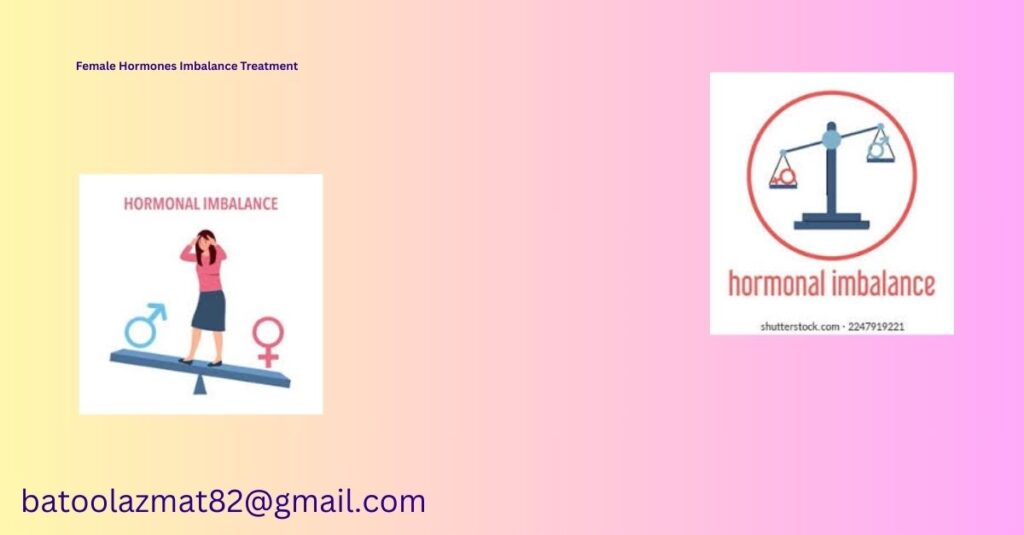Introduction: When Your Body Feels Off, It’s Time

Female Hormones Imbalance Treatment Hormones are your body’s chemical messengers—controlling everything from your energy levels and sleep to your mood, metabolism, and reproductive system. For women, hormonal balance is especially delicate.
The good news? Hormonal imbalance isn’t a life sentence. Whether caused by stress, lifestyle, menopause, or medical conditions like PCOS or thyroid issues, female hormones imbalance treatment is possible—and often highly effective with the right approach.
In this article, we’ll break down the causes, symptoms, and best treatment options for hormonal imbalance in women, including natural remedies, lifestyle changes, and medical interventions.
What Is Hormonal Imbalance in Women?
Since hormones affect nearly every bodily function, even minor imbalances can have major effects.
Common Female Hormones Affected Include:
- Estrogen – the primary female sex hormone
- Progesterone – important for menstruation and pregnancy
- Testosterone – typically thought of as a male hormone but plays a role in female health
- Thyroid hormones – regulate metabolism
- Cortisol – the stress hormone
- Insulin – controls blood sugar
H3: Physical Symptoms
- Irregular or missed periods
- Weight gain or difficulty losing weight
- Chronic fatigue
- Sleep disturbances or insomnia
- Hot flashes or night sweats
- Hair thinning or excessive facial/body hair
- Acne or dry skin
- Bloating or digestive issues
H3: Emotional and Mental Symptoms
- Mood swings
- Anxiety or depression
- Brain fog or difficulty concentrating
- Low libido
- Irritability
H2: Causes of Hormonal Imbalance in Women
H3: 2. Poor Diet
Diets high in sugar, refined carbs, or processed foods can disrupt insulin and estrogen levels.
H3: 3. Lack of Sleep
Sleep regulates hormones like melatonin and cortisol.
H3: 4. PCOS (Polycystic Ovary Syndrome)
PCOS causes elevated androgens, leading to irregular periods, acne, and fertility issues.
H3: 6. Perimenopause and Menopause
Hormone levels naturally fluctuate with age, especially during these transitional stages.
H2: Female Hormones Imbalance Treatment Options
There is no one-size-fits-all solution. The best treatment approach depends on your symptoms, lifestyle, age, and underlying causes. Let’s explore your options:
H3: 1. Natural and Lifestyle-Based Treatments
Balanced Diet
- Reduce sugar and refined carbs
- Incorporate hormone-balancing foods like flaxseeds, leafy greens, and cruciferous vegetables
Exercise Regularly
- Moderate activity (30–45 minutes daily) improves insulin sensitivity and reduces cortisol
- Include strength training and yoga for hormone balance
Manage Stress
- Practice mindfulness or meditation
- Deep breathing or progressive muscle relaxation
- Reduce screen time and digital overload
Sleep Hygiene
- Aim for 7–9 hours of quality sleep
- Maintain a consistent sleep schedule
- Avoid blue light before bed
Supplements (Always consult your doctor first)
- Magnesium – supports adrenal function
- Vitamin D – regulates estrogen and progesterone
- Ashwagandha – reduces cortisol
- Omega-3s – anti-inflammatory and hormone-supportive
H3: 2. Medical Treatments for Hormonal Imbalance
When symptoms are more severe or persistent, medical intervention may be necessary.
Hormone Replacement Therapy (HRT)
Birth Control Pills
Often prescribed for PCOS or menstrual regulation. They control ovulation and stabilize hormone levels.
Thyroid Medication
For hypothyroidism or hyperthyroidism, thyroid hormone replacement or regulating drugs are used.
Insulin-Sensitizing Medications
For women with PCOS or insulin resistance, drugs like metformin can help regulate insulin and reduce androgen levels.
H2: Real-Life Example: Ayesha’s Hormone Healing Journey
With support from her doctor and a few lifestyle changes, Ayesha’s symptoms began to improve in just a few months.
H2: When to See a Doctor
If you notice persistent symptoms like irregular periods, extreme fatigue, or unexplained weight changes, don’t wait. A blood test can help identify:
- Estrogen, progesterone, and testosterone levels
- Thyroid function (TSH, T3, T4)
- Cortisol and insulin levels
Conclusion: Balancing Hormones Is About Listening and Responding
Female hormones are like a symphony—when one instrument is off, the whole tune feels wrong. But with the right female hormones imbalance treatment, your body can get back in tune.
You don’t have to suffer in silence. Whether you’re in your 20s dealing with stress, in your 40s managing perimenopause, or just trying to feel more like yourself again, help is available—and it works.
FAQs: Female Hormones Imbalance Treatment
Can hormonal imbalance be fixed naturally?
Yes, many mild to moderate cases can be managed with diet, exercise, sleep, and supplements. Severe cases may need medical treatment.